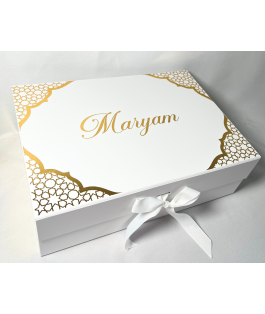Planning a Muslim wedding is a special journey filled with love, faith, and family. From the meaningful nikah to the colourful mehndi night, every moment matters. But with so many details to organise, it can start to feel a little overwhelming.
Enter the Riwaya Online Muslim Wedding Planner - a free, interactive tool designed to simplify your wedding planning while honouring Islamic traditions.
12 Months Before: Setting Intentions and Foundations
Begin with Niyyah (Intention)
In Islam, every action starts with a sincere intention. Approach your wedding planning with the aim of seeking Allah's blessings and fostering a harmonious union.
Budgeting and Vision
Discuss your wedding vision with your partner and family. Set a realistic budget that aligns with Islamic principles of moderation. The Riwaya planner's budget tracking feature allows you to monitor expenses, ensuring you stay within your means.
Celebrate Your Culture
Riwaya offers culture-based planning presets tailored to various heritages, including Pakistani, Bengali, Arab, and Somali weddings. These presets provide checklists for traditional events like Mayoon, Gaye Holud, or Tolbe, ensuring no cultural nuance is overlooked with the flexibility to add your own preferences.
9–6 Months Before: Booking and Designing

Secure Key Vendors
Book your venue, caterers, photographers, and nikah officiant early. Use Riwaya's planner to store vendor contacts and track booking statuses, keeping all information in one accessible place.
Guest List Management
Compile your guest list, considering the capacity of your chosen venues. Riwaya's planner allows you to create and manage guest lists for each event, streamlining the invitation process.
Outfit Planning
Begin shopping for wedding attire. Riwaya's marketplace features a curated selection of modest Islamic wedding dresses, blending elegance with cultural authenticity.
6–3 Months Before: Finalising Details
Invitations and Décor
Design and send out invitations that reflect the spirit of your wedding. You might choose elegant calligraphy, floral motifs, or simple digital invites. At this stage, finalise your décor preferences too. Think about colours, themes, and whether you’ll be incorporating Islamic or cultural symbols. From the stage design to the centrepieces, this is your time to make it personal and meaningful.
Premarital Preparation
This is not just a time for logistics - it’s also a time for the heart. Many couples choose to attend pre-marital counselling or Islamic courses to strengthen their foundation before marriage. Discuss your hopes, fears, and expectations with each other. Speak to scholars or mentors you trust. Nourish your connection with Allah and prepare spiritually for this blessed journey.
Final 2 Months: Confirmations and Rehearsals
Vendor Confirmations
Now’s the time to follow up with all your vendors. Confirm arrival times, payment plans, and final details for the venue, catering, entertainment, and transportation. It’s wise to write everything down and double-check contracts. This is also when many couples start assigning point-of-contact persons for each vendor to ensure things run smoothly on the big day.
Seating Plans and Itineraries
Draft seating arrangements for each event and finalise timelines. Share itineraries with family members, bridesmaids, groomsmen, and your vendors so everyone knows where to be and when. If you’re planning multiple events (like mehndi, nikah, and walima), map out how the days will flow, especially if you’ll be changing locations or outfits between events.
Week of the Wedding: Final Touches
Self-Care and Spiritual Focus
This week will fly by, so take time for yourself. Delegate as much as possible and avoid getting overwhelmed with last-minute errands. Carve out moments of stillness, recite duas, and make time for prayers. Begin your marriage with a heart full of gratitude and tawakkul (trust in Allah). Surround yourself with calm, kind energy.
Emergency Kit and Delegation
It’s always wise to have an emergency kit ready - safety pins, plasters, a mini sewing kit, breath mints, tissues, spare hijab pins, and makeup for touch-ups. Prepare one for both the bride's and groom’s sides. Also, assign trusted friends or siblings to take care of specific responsibilities like ushering guests, overseeing décor, or coordinating food service. You don’t need to handle everything alone.
Why Use the Riwaya Online Muslim Wedding Planner?
 Planning a wedding rooted in Islamic values and diverse cultural practices isn’t always easy, but it can be smooth, organised, and even enjoyable with the right tools.
Planning a wedding rooted in Islamic values and diverse cultural practices isn’t always easy, but it can be smooth, organised, and even enjoyable with the right tools.
Here’s how the Riwaya Online Muslim Wedding Planner supports your journey:
1. Cultural Presets: Whether you’re planning a Pakistani, Bengali, Arab, or Somali wedding, Riwaya provides tailored planning templates that reflect your unique traditions.
2. Step-by-Step Task Breakdown: Each stage of your wedding planning is clearly organised, from booking venues to writing your guest list.
3. Budgeting Made Simple: Track your spending across categories so you stay financially conscious and avoid unnecessary stress.
4. Stay on Track: Set timelines, check off to-dos, and feel confident as you move closer to your big day.
5. Collaborative Planning: Share access with your family or fiancé(e) to plan together, ensuring everyone stays informed.
Conclusion
Planning a Muslim wedding is a journey of love, faith, and community. With the Riwaya Online Muslim Wedding Planner, you have a comprehensive, culturally sensitive tool to guide you every step of the way. From budgeting to guest management, Riwaya ensures your wedding planning is organised, stress-free, and aligned with Islamic values.
Begin your journey today by visiting Riwaya's Online Muslim Wedding Planner. Embrace the joy of planning your blessed union with confidence and ease.
Selling with Riwaya
Do you sell Islamic wedding essentials or thoughtful gifts?
Join Riwaya - the UK's fastest-growing Islamic marketplace, and get your products in front of thousands of Muslim shoppers every day.
Whether you offer nikah favours, Islamic home décor, modest outfits, or meaningful wedding gifts, Riwaya is the perfect platform to help your brand grow.
With built-in SEO, free marketing support, and a growing customer base, all you need to do is list your products and fulfil your orders - we’ll handle the rest.
Start selling today and grow your brand with Riwaya.



















































